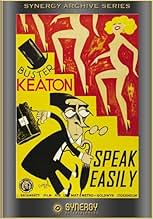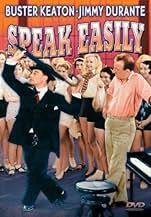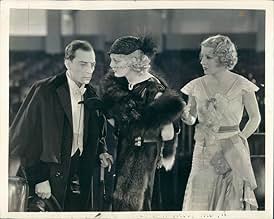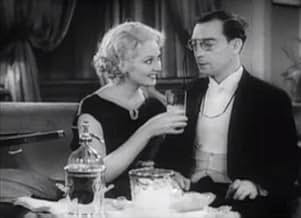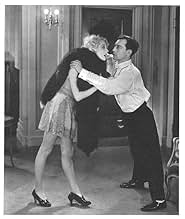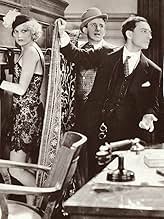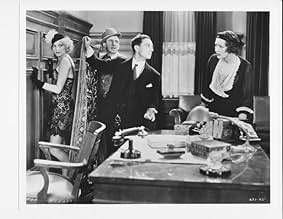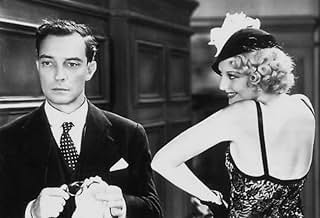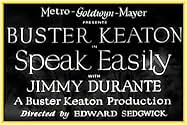IMDb-BEWERTUNG
5,8/10
1247
IHRE BEWERTUNG
Füge eine Handlung in deiner Sprache hinzuA timid professor inherits a large sum of money and decides to fund a terrible musical.A timid professor inherits a large sum of money and decides to fund a terrible musical.A timid professor inherits a large sum of money and decides to fund a terrible musical.
- Regie
- Drehbuch
- Hauptbesetzung
Loretta Andrews
- Chorus Girl
- (Nicht genannt)
Oscar Apfel
- Lawyer's Representative
- (Nicht genannt)
Reginald Barlow
- Billington
- (Nicht genannt)
Jack Baxley
- Tom - Sheriff's Deputy
- (Nicht genannt)
Sidney Bracey
- Jenkins
- (Nicht genannt)
Jim Farley
- Station Agent
- (Nicht genannt)
DeWitt Jennings
- Sheriff of Lincoln County
- (Nicht genannt)
Fred Kelsey
- Process Server
- (Nicht genannt)
Empfohlene Bewertungen
Keaton fans, you will not "die a thousand deaths" if you view this. Nothing Keaton does is bad, if for nothing else then for his presence. That being said, Buster was a silent start who was best when doing stuff created by his own mind. By 1932, the silent era was dead and the studios owned the movies. That Buster Keaton of "Seven Chances" and "Steamboat Bill Jr." was no more. That could never be recreated.
Times changed, films changed, and Buster adapted. Better this Buster than no Buster.
The story is funny, and there is some amusing slapstick. Buster plays his role well, adds some Buster to it, and is believable as a clueless college professor. Jimmy Durante is larger than life, in a hammy sort of way, but it's a good contrast with Keaton if anything. The movie works, and the closing scenes the show on Broadway is madcap with a modicum of brilliance.
We can ask what if. What if the silent era had never ended? What if Keaton and Arbuckle had not been separated so suddenly? What if the studios had taken over the industry with their formulae? Look, this is a pretty good film. It's not Keaton being tragically reduced to nothing. (Such was never possible! The great ones always adapt.) The tragedy is what happened to Roscoe Arbuckle. What happened to Buster? He hung in there and made people laugh.
Times changed, films changed, and Buster adapted. Better this Buster than no Buster.
The story is funny, and there is some amusing slapstick. Buster plays his role well, adds some Buster to it, and is believable as a clueless college professor. Jimmy Durante is larger than life, in a hammy sort of way, but it's a good contrast with Keaton if anything. The movie works, and the closing scenes the show on Broadway is madcap with a modicum of brilliance.
We can ask what if. What if the silent era had never ended? What if Keaton and Arbuckle had not been separated so suddenly? What if the studios had taken over the industry with their formulae? Look, this is a pretty good film. It's not Keaton being tragically reduced to nothing. (Such was never possible! The great ones always adapt.) The tragedy is what happened to Roscoe Arbuckle. What happened to Buster? He hung in there and made people laugh.
I watched 'Speak Easily' one night and thought it was o.k., but missing something. Maybe Buster Keaton strangely speaking threw me off, or the labored line delivery of a leading lady. The next day I kept thinking about the movie, though. I couldn't get Durante's song out of my head, I kept trying to better remember Thelma Todd's first scene, I considered that maybe Keaton did do some funny falls and physical comedy. The next night I watched a scene with Thelma Todd as a conniving chorus girl trying to impress Buster and Jimmy with her sex appeal. A very funny scene, the actors excellent, their faces, their eyes, their silly expressions. So I watched another scene, their show is opening on Broadway. Buster in his blissful innocence botches every act. Again, I was laughing out loud, appreciating Keaton's clowning and tumbling. So the next night I watched the whole movie again, and this time I see it for the first time: It's Stupendous! It's Sensational! It's Sublime! Three great comedians! Todd dances! Durante sings! Keaton speaks! Sure it ain't poifect...but there's a lot of laughs in this picture.
While it is true that SPEAK EASILY doesn't hold a candle to the genius of Keaton's best films, neither is it worthless as some have suggested. Outside pressures (namely MGM and his deteriorating family life) held Keaton back from performing at the inspired level he might have. SPEAK EASILY's main weakness lies in MGM forcing an uninspired pairing of Keaton with a vaudeville comic like Durante. The tension between Buster's physical comedy (which is never allowed to ignite as it once had) and Durante's verbal punning is something that never really works. Keaton's characters in all of the MGM talkies seem, for lack of a better word, dense. The inherent cleverness that Buster showed in his silent work was totally abandoned. Never again would Buster show the bravado, daring and quickness he was famous for. Instead, he would be shoe-horned by MGM into a series of roles as loser, victim and sap. For all those inherent problems, SPEAK EASILY still contains at least two slapstick sequences that prove Keaton could be just as funny in his talkies as he was in his silent work. The 'drunken seduction' with Thelma Todd's gold-digger is very funny. Miss Todd proves herself not only a fine comedienne, but shows excellent chemistry with Keaton. Also, Buster's utter, and totally inadvertent, destruction of the Broadway play during it's opening night performance is hysterical and features some fine stunt gags. Those looking for the sublime genius of THE GENERAL or SHERLOCK JR. will invariably be disappointed. That 'Buster' was long gone by this point in his career. SPEAK EASILY should be viewed as an enjoyable programmer that kept Buster working, if not at his peak, still as a capable gag man and entertainer. Admiring fans with an open mind will find much to enjoy here
This film really, really depressed me. Not only was it completely unfunny, it did absolutely nothing with it's star Buster Keaton. It was odd to hear his voice, but even stranger to see him not do any of the routine that he's so famous for. Thelma Todd is also dreadfully waisted. She's beautiful, as always, but that's the film's only redeeming quality. And the story was atrocious. I've never seen a film so padded (well, maybe Blue Crush). This one should only be seen so people will see how hard the advent of sound struck film history. If it had come thirty years later, after more work and evolution, films like Speak Easily might never have been made.
Not laugh out loud funny, by still mildly amusing and lighthearted tale of an introverted professor whose supposedly inherited a fortune and decides to bankroll an inept broadway play until his fortune attracts the attention of a tenacious gold-digger (Todd).
Keaton's antics are subdued here appearing as the straight man to Durante's comic antics, whilst there's ample support from future 'Charlie Chan' Toler as the besieged stage director, and vivacious Thelma Todd as the would-be wife who sees an opportunity to secure acting fame and fortune via the cashed-up Keaton. Their drunken apartment liaison is probably the film's highlight, elsewhere proceedings sometimes become tedious and trivial despite a straightforward plot.
Mild romantic comedy doesn't become too ambitious, playing the formula sufficiently well to entertain despite some occasional pacing problems, 6/10.
Keaton's antics are subdued here appearing as the straight man to Durante's comic antics, whilst there's ample support from future 'Charlie Chan' Toler as the besieged stage director, and vivacious Thelma Todd as the would-be wife who sees an opportunity to secure acting fame and fortune via the cashed-up Keaton. Their drunken apartment liaison is probably the film's highlight, elsewhere proceedings sometimes become tedious and trivial despite a straightforward plot.
Mild romantic comedy doesn't become too ambitious, playing the formula sufficiently well to entertain despite some occasional pacing problems, 6/10.
Wusstest du schon
- WissenswertesSecond of three films in MGM's pairing of Buster Keaton and Jimmy Durante as a comedy team. The other pictures were Wer andern keine Liebe gönnt (1932) and Bier her! (1933).
- PatzerWhile Professor Post (Buster Keaton) is dragged by the train, clutching his luggage, his hat flies off and he is unable to grab it. In the next shot, his hat is once again firmly on his head.
- Zitate
Eleanor Espere: Tell me, Timmy. Have you ever seriously thought of marriage?
Professor Post: Yes... that's why I'm single.
- VerbindungenFeatured in Das gibt's nie wieder (1974)
- SoundtracksGood Times Are Here Again
(1932) (uncredited)
Music by David Snell and Charles Maxwell
Lyrics by Samuel Marx
In the score during the opening credits and at the end
Played on piano by Jimmy Durante and sung by the chorus at the opera house
Played often in the score
Top-Auswahl
Melde dich zum Bewerten an und greife auf die Watchlist für personalisierte Empfehlungen zu.
Details
- Laufzeit
- 1 Std. 22 Min.(82 min)
- Farbe
- Seitenverhältnis
- 1.37 : 1
Zu dieser Seite beitragen
Bearbeitung vorschlagen oder fehlenden Inhalt hinzufügen

